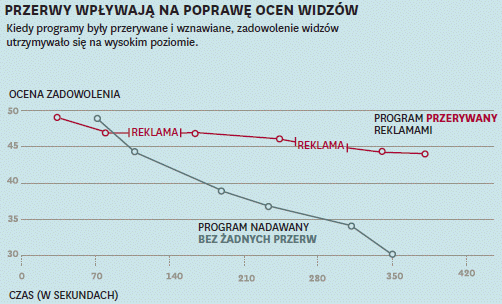According to Harvard Business Review Polska, which published the study, two test groups were shown three types of programs:
- episodes of the comedy series *Taxi*,
- documentary nature films,
- and Bollywood productions.
One group watched the programs without ads, while the other saw them with ad interruptions. The results were surprising: the group that saw the shows with ads was more satisfied with the programs, regardless of the quality of the ads shown.
 source: Harvard Business Review Polska, Why Do We Prefer TV with Ads?
source: Harvard Business Review Polska, Why Do We Prefer TV with Ads?Surprisingly, viewers who watched the version with ads were also willing to pay more for DVD sets of productions by the same directors. The study published by Harvard Business Review Polska found that this difference could be as much as 30%.
- viewers of the ad-free version offered $4.18 for a DVD
- viewers of the ad-supported version were willing to pay up to $5.42 for the same DVD.
The study authors note that this principle is reflected in pay TV, even though it doesn’t include ads. These networks structure their programming with built-in breaks.
- What increases viewer enjoyment isn’t the ads themselves but the breaks in the show, - explains Prof. Leif Nelson in an interview with HBRP. - In series, the plot usually consists of six or more parallel storylines that producers continuously juggle. More complex and unpredictable shows, with twists that naturally introduce breaks, were rated higher than programs with a more linear narrative structure.
This is known as the adaptation effect. The researchers found that this effect is much stronger among younger people. As people age, they need less stimulation to feel pleasure and adapt more slowly.
Nelson, Meyvis, and Galak`s research was also published in the Harvard Business Review Polska special report Why Do We Prefer TV with Ads?
COMMERCIAL BREAK
New articles in section Marketing and PR
Brand visibility in the age of algorithms
Aleksander Pawzun
A few years ago, everything was simpler. It was enough to have a good website, do SEO, run a blog, and publish on social media. Whoever was systematic was visible. Whoever invested in content and positioning gained customers. That world no longer exists.
Queue psychology. Scientists' discovery used in Call Centers
Andrzej Sowula
The discovery first described by psychologists in the second half of 2024 concerns the so-called "relative progress effect". When customers observe fast service at the beginning of their wait, they tolerate slower service much better later in the waiting period.
#POMAGAM2026 Can a New Year's resolution go viral?
wspieramy
Is a million good deeds a lot? Ten-year-old Emilka wants to find out. She just announced the I Resolve to Help campaign on the internet and urges everyone to make a unique New Year's resolution. That we help each other more often in 2026.
See articles on a similar topic:
What to do when your child lies? Advice from a pedagogue
patronat Reporterzy.info
Does your little one invent outrageous stories, and you’re unsure how to react? Does your child tell friends that you’ve traveled the world and that your dog speaks with a human voice? A pedagogue explains how to handle such situations and avoid them in the future. The weekly Reporterzy.info is the media patron of the series.
Dietary Supplements. How Products Masquerading as Medications are Sold
Ewa Zygadło-Kozaczuk
Colorful packaging entices us with miraculous health benefits, and we buy them, hoping for a fit body, good sleep, great mood, and excellent sex. But do we know what lies behind that magical pill, capsule, or syrup? Are we aware that these advertised products are merely masquerading as medications?
Short Social Video. IAB Poland Report on Short Videos in Social Media
Krzysztof Fiedorek
According to the IAB Poland report from May 2024, short video clips are becoming increasingly popular in Poland. In 2023, 61% of internet users in Poland watched the format known as short social video, and 23% of them created such videos themselves. Polish internet users spend an average of 43 minutes a day watching them.
Online advertising 2024/2025 report by IAB Poland
KFi
Online ads now consume 57% of all budgets. Companies spent 1.62 billion PLN on video formats alone. After leaner years, the numbers are rising sharply. Digital advertising grew by 20% in a year. Traditional formats are slowly fading.





























